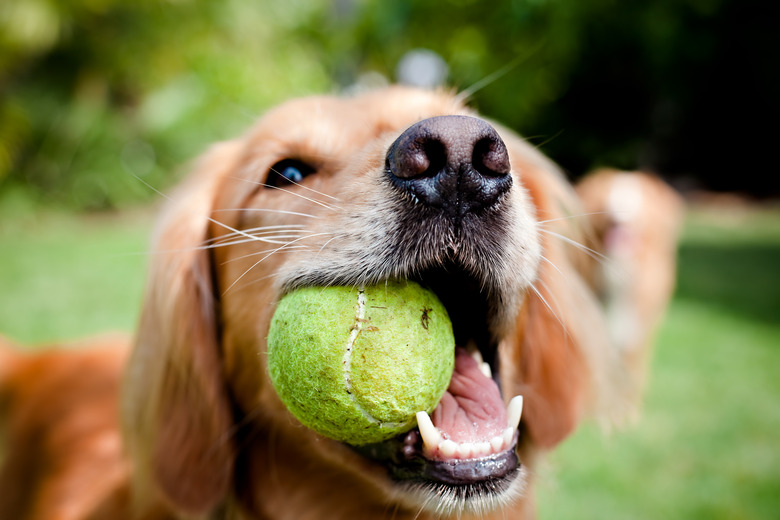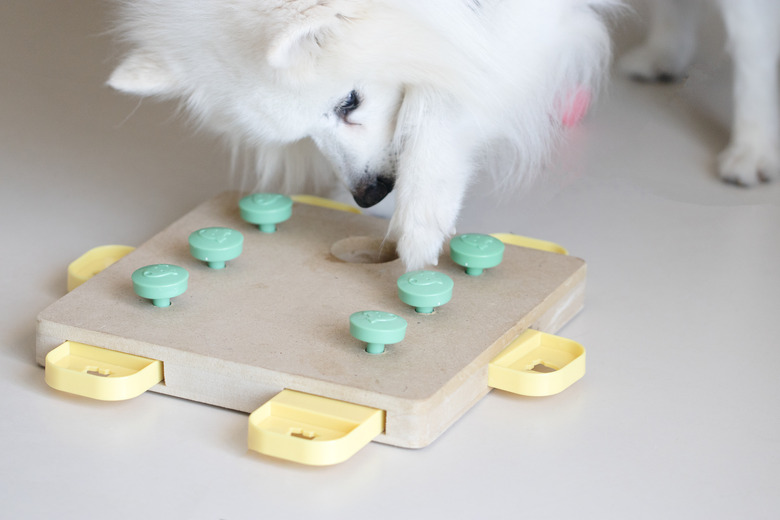Stop Trying To Make Fetch Happen: Should Your Dog Be Playing Fetch?
Is your dog ball-obsessed? Fetch might seem like the perfect game, but unfortunately, it isn't without risks. In fact, although a lot of dogs love to play fetch, you might want to think twice before you start throwing a ball or stick for your dog to retrieve. injuries.
The hidden injury potential of playing fetch
Depending on your dog's overall health, temperament and how you play, fetch might be a game you want to avoid or reconsider Dr. Mandi Blackwelder, DVM, Certified Canine Rehabilitation Practitioner (CCRP) Certified Veterinary Acupuncturist (CVA) amd owner of Healing Arts Animal Care, explains that fetch can be dangerous for dogs who are fixated on the fame and ball-obsessed because for these dogs fetch is "an explosive activity." While playing fetch, "the dog is not paying attention to their body, they are paying attention to the ball or the stick...balls have an unpredictable bounce which causes dogs to make fast body adjustments.”
As a result, many dogs land oddly while playing, or put repetitive stress on their joints which can lead to serious injuries like knee injuries, specifically cruciate tears.
Common fetch injuries
Common fetch injuries
Although dogs can be injured while playing fetch in a variety of ways, Dr. Blackwelder explains, the most common types of injuries that occur are collisions, cruciate tears, and mouth injuries.
- Collisions: Ball-obsessed dogs who are so intensely focused on getting the ball,
and not on what their body is doing can and do run directly into objects
such as walls, fences, and trees. Although some people think it's funny to
see a dog run into things this can lead to serious injuries, and even be
fatal if a dog hits their head/neck the wrong way. Dogs can also be
injured by falling into mole, gopher, or other holes while running in a
field or park.
- Cruciate tears: Dr. Blackwelder explained that this is the primary injury that takes
place for dogs who play a lot of fetch. She notes that this is an injury
that generally occurs slowly over time. "One ball episode does not tear a
cruciate, it's usually multiple minor tears over time." This can be
confusing for dog guardians because these soft tissue injuries occur over time,
so dog guardians don't see the injury occurring and don't know immediately
how their dog was hurt. Healing a cruciate injury generally involves a
surgical procedure to stabilize the knee and rehabilitation care.
- Mouth injuries: Dr. Blackwelder warns that playing fetch with sticks can be
especially dangerous noting that as "dogs run with sticks, and the stitch
catches on the ground they can tear up their mouth or their throat." These
mouth and throat injuries can be extremely painful and difficult to heal
because of the bacteria in your dog's mouth.
Is your dog healthy enough to fetch?
Is your dog healthy enough to fetch?
If you want to play fetch with your dog, Dr. Blackwelder encourages talking with your veterinarian first. For healthy adult dogs, your vet may say that fetch is ok. For dogs in peak physical health, especially herding dogs whose bodies are developed to move quickly and change direction, suddenly fetching might not be too dangerous an activity.
However, if your veterinarian has concerns about your dog's orthopedic health, they may recommend joint x-rays before you play. Cruciate injuries are the big health issues that come up, but you should be aware if your dog has other orthopedic conditions like elbow problems, or hip issues which can be exacerbated by playing fetch. Dr. Blackwelder notes that dogs who are overweight and not conditioned shouldn't go out and play fetch as it can increase the risk of injuries.
Change the way you play fetch
Change the way you play fetch
If your dog loves fetch, you don't necessarily have to give up the game completely! Dr. Blackwelder explains that fetch-related injuries are especially common when dogs are chasing balls thrown overhand because it increases the likelihood of an unpredictable bounce. This is compounded when balls are thrown in a ball launcher or chuck-it toy. Although these toys can get a further throw, they make the ball less predictable where it will land which can increase the risk of injury.
Instead, Dr. Blackwelder encourages dog guardians to play fetch by "bowling" the ball or throwing the ball underhanded. This helps to reduce the bounce of the ball and make the direction more predictable for our dogs.
A soft grassy place is the safest place to play fetch (unless it has many holes). Fetching into water for dogs who are good swimmers is even safer, but make sure to end fetch sessions early, as dogs tire faster in water and can get caught in currents.
Dr. Blackwelder explains the best way to prevent fetch injuries is to change how you throw, and stop playing fetch long before you think your dog might be getting tired. When dogs start to get tired, they are less aware of their body's movements and can move incorrectly and cause injuries to themselves.
Fetch alternatives
Fetch alternatives
If you're feeling nervous about the risks associated with fetch, it doesn't have to be the only way to play with your dog. Instead, consider engaging your dog in more puzzles. You can also introduce scent training games with your dog for an exciting game that is less hard on their joints. For dogs who are ball or toy obsessed you can take a favorite toy and instead of throwing it, hide it around your house or yard for your dog to find. These kinds of games get your dog up and moving but aren't high impact or as likely to cause repetitive stress injuries to dogs as they play.
The bottom line
The bottom line
Although many dogs love to play fetch, it can have unexpected dangers and lead to injuries for some dogs. To help keep your dog safer while playing fetch, it's best to stop using ball launchers. Instead, "bowl" the ball with an underarm toss as you throw it for your dog. This will help reduce the erratic bouncing of the ball, which can lead to dogs changing direction quickly and injuring themselves. There are also many alternatives to fetch, such as puzzles and scent games, that can enrich your dog's life just as much as a rousing game of fetch.





